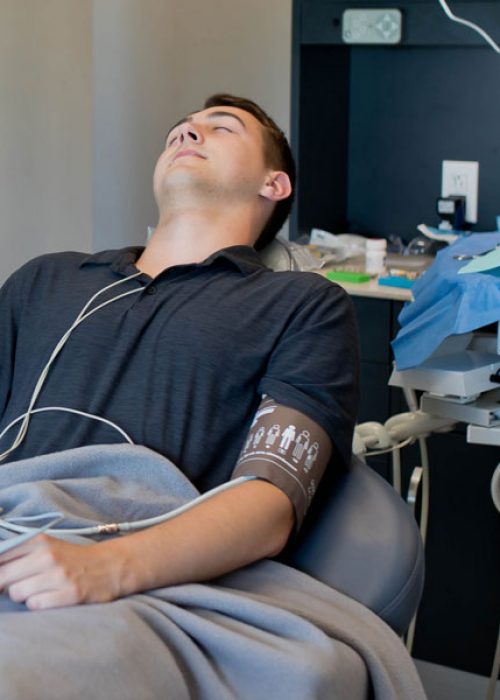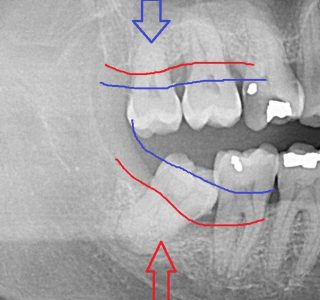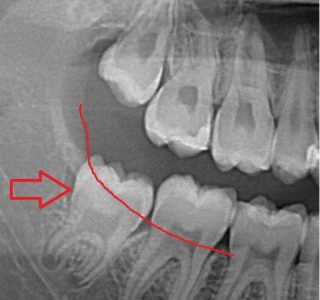Oral Surgery
Not your average dentist
While many general dentistry offices in the area advertise oral surgery, even “wisdom tooth” removal, the reality is that most of these impacted wisdom teeth that are being diagnosed in these offices are being referred out to an oral surgeon’s office, especially if the patient wants to sleep through the procedure.
Wisdom teeth removal IS LITERALLY ALL WE DO
At Iowa Wisdom Teeth, we only focus on providing the most comfortable, safe and affordable experience for removal of wisdom teeth on teenagers and young adults. All our patients pleasantly sleep through the procedure, with no memory of it afterward. Don’t let your dentist convince you that laughing gas (nitrous) or pills (oral sedatives) will make you comfortable for your surgery appointment – go with the affordable choice that can give the best experience every time.

YOU can decide where to have your wisdom teeth or your child’s wisdom teeth removed
Don’t let your dentist dictate where you go or who you see for this. If you were referred to an oral surgeon’s office for your wisdom teeth, but would like a second opinion, and more affordable option to remove them.Consults, estimates and x-ray images are always free.
Types of wisdom teeth we routinely remove
Below are all examples of the types of oral surgery extractions we do in our office and with our partners, all patients were under IV deep sedation and slept through the procedure. These are all from completed cases at our office or affiliates.

Simple extraction (blue arrow)
- Tooth is above the gums, bone removal is required.
- Soft Tissue Impacted (red arrow): Crown of the tooth is covered by tissue only.
- (blue line is tissue level, red line is bone level)

Part Boney Impacted
- 50% or less of the crown is covered in bone (red line demarcates bone level in relation to crown).

Full Boney Impacted
- 50% or more of the crown is covered in bone.
- Blue and red line demarcates level of bone compared to crown of tooth.
When would I need oral surgery for removal of wisdom teeth?
Noted common symptoms of Impacted wisdom teeth that need to be removed include:
- Jaw pain
- Swelling or Stiffness in the Jaw
- Bad Breath
- Swollen, Tender or Bleeding Gums
- Difficulty opening your mouth
While these are the most common symptoms we see at consultation, many times the impacted wisdom teeth display no symptoms at all.

FAQs for Oral Surgery
Will I experience much bleeding?
After oral surgery to remove wisdom teeth, it is normal for the extraction sites to experience minimal bleeding. For any bleeding after you leave the office (rare), make sure to bite down firmly on the sterile gauze provided in your post op bag. Before placing the gauze, make sure to dampen it. After your oral surgery appointment don’t be concerned if there is some oozing from the surgical sites in the first 24-48 hours after the procedure. To minimize swelling and bleeding, and prevent lightheadedness, keep your head elevated while resting by using two pillows.
Should I be worried about swelling?
SWELLING IS A NORMAL PART OF THE HEALING PROCESS AFTER ORAL SURGERY; EXPECT SOME PAIN FROM IT- we cannot reiterate this enough. To help reduce swelling, you should apply ice packs to the surgical area for the first 24-48 hours. If you are using a freezer pack, do not apply it directly to your skin, as the extreme cold can cause damage to the tissue. Also, apply it in increments of no more than 15 minutes. Maximum swelling typically peaks at 72 hours and will gradually subside in the following days. However, this can be dependent upon the oral surgery procedure that you have completed. On the 3rd to 5th day after surgery, as the swelling begins to go down, you can switch to using mild heat to help increase blood flow to the surgical site, which will speed up the reduction of swelling.
What can I do to care for the surgical sites after the surgery?
After your oral surgery procedure, it is important to wait 24 hours before rinsing your mouth with anything. Once 24 hours have passed, you may rinse your mouth with warm salt water (made by mixing 1 teaspoon of salt with 1 cup of water) or with the Peridex mouth rinse that was prescribed to you. When rinsing, DO NOT SWISH. Fill your mouth with the water or Peridex, tilt your head from side to side to allow the rinse to wash over the surgical sites, and then gently let the liquid spill out into the sink. Repeat this process for 7 days, even though it may not be comfortable. If you need to rinse your mouth in the first 24 hours, do so as gently as possible.
What is Dry Socket?
Dry socket is a common complication after oral surgery, when a blood clot from your extraction site is dislodged and does not reform, leaving the bone lining the inside of the extraction sockets exposed to the oral environment. If this were to happen, it typically arises between day 3 and 5 of healing after oral surgery and post-op analgesics will do nothing to control the discomfort. If you experience any symptoms of dry socket after your oral surgery, such as severe pain or a foul taste in your mouth, contact us for further recommendations.
What are Autogenous Blood Concentrates?
Autogenous blood concentrates (what we produce from your blood), or Platelet Rich Fibrin, is used to prevent dry socket after oral surgery. This is a procedure that was invented to use for skin burn units in the early 2000s but has since found great application in oral surgery. Multiple studies show application of the PRF to mandibular wisdom tooth extraction sockets during oral surgery will prevent dry socket in 98% of cases. By spinning the blood in a centrifuge without anticoagulants, it separates the red blood cells from the platelets as it clots, condensing and increasing the density of the clot as well as concentrating the immune cells, including monocytes in the thick clear platelet layer. This “superclot”, as we call it in oral surgery, is 4x denser than what your body can produce and sticks very well to the extraction socket bone which is why it does such a great job of preventing dry socket. It is also extremely biocompatible because it is made from you! It has been shown to also accelerate the healing process for the first 7 days after oral surgery as you are applying an immune cell and biochemically rich clot to the extraction sites.
How much does oral surgery for wisdom tooth removal cost?
We offer flat fee prices for oral surgery procedures related to wisdom teeth, including IV deep sedation, consultation, and X-ray imaging (if required). Our prices are as follows: $2500 for the removal of all four wisdom teeth, $2100 for three, $1700 for two, and $1300 for the removal of a single wisdom tooth.
Is oral surgery painful?
Oral surgery can be an uncomfortable procedure, but the level of pain experienced varies depending on the type and complexity of the surgery, and the patient’s pain tolerance. Common oral surgeries such as tooth extraction or wisdom teeth removal may cause mild discomfort or soreness that can be managed with over-the-counter pain medication. Your surgeon will discuss the expected level of pain and provide instructions for managing it after the surgery to help ensure a smooth and comfortable recovery.
When can I return to work or school after oral surgery on my wisdom teeth?
After oral surgery to remove wisdom teeth, the recovery period typically lasts for several days to a week, during which time you should rest and avoid any strenuous activity. The specific time when you can return to work or school after oral surgery on your wisdom teeth depends on a few factors such as the extent of the surgery, your overall health, and your ability to manage any post-surgical discomfort. In general, most people can return to work or school within 2-3 days after the procedure. It’s important to follow your surgeon’s instructions carefully to ensure a smooth and speedy recovery from oral surgery.
Let's remove your wisdom teeth
Choose the safe, affordable and convenient way to remove your wisdom teeth. Contact us today.

